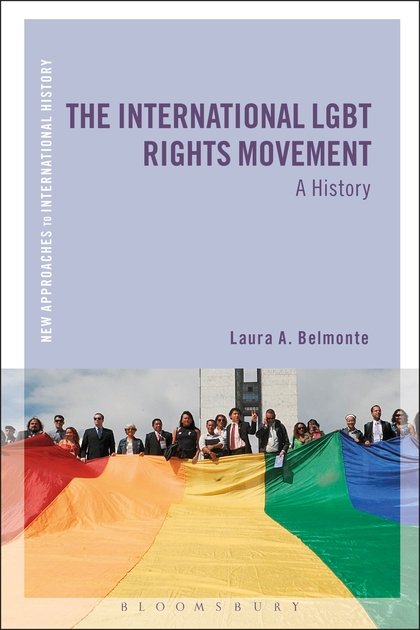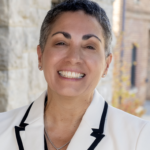Laura A. Belmonte
The International LGBT Rights Movement is the first effort to synthesize the history of the international lesbian, gay, bisexual, and transgender rights movement. It offers a comprehensive account of this global force, from its origins in the mid-nineteenth century to its crucial place in world affairs today, and examines the movement’s goals, the disputes about its mission, and its rise to international importance. The International LGBT Rights Movement provides a thorough introduction to the movement’s history, highlighting key figures, controversies, and organizations. With a global scope that considers both state and non-state actors, the book explores transnational movements to challenge homophobia, while also assessing the successes and failures of these efforts along the way. Aimed at general readers of non-fiction, those interested in the history of human rights and LGBT equality, and undergraduates, it is consciously written in an approachable style that avoids jargon and that aims to inspire readers to learn more about advocacy and activists across many eras and in multiple countries.

NOTCHES: What drew you to this topic, and what questions do you still have?
Laura Belmonte: I wanted to provide an introductory volume that could be used in multiple contexts and that would weave together a huge amount of secondary literature into a gripping narrative. This book is only a synthesis, so I hope that it inspires others to pursue many further avenues of inquiry that are not developed in depth here. There are many countries for whom we do not yet have national LGBT histories written and there are significant gaps in the historical evidence base that have so far limited our long-range understanding of particular eras, regions, and subcultures.
NOTCHES: This book engages with histories of sex and sexuality, but what other themes does it speak to?
LB: The history of human rights, the interconnections among activist movements, and a fragility of civil rights that must be continually guarded.
NOTCHES: How did you research the book?
LB: The book is a combination of a huge amount of secondary sources interwoven with primary sources viewed at an array of archives that included the IHLIA collection in Amsterdam, the Hall-Carpenter collection at the London School of Economics, and the ONE Collection at the University of Southern California, as well as many newspapers and publications. It was particularly exciting, though somewhat daunting, to discover that the transnational roots of the LGBT rights movement go much further back in time than one might expect. What I initially envisioned as a post-World War II story quickly morphed into a narrative that began in the late 18th century.
NOTCHES: Whose stories or what topics were left out of your book and why? What would you include had you been able to?
LB: The sheer volume of the materials, the globe scope and chronological breadth of the topic, and the limits of an 80,000-word maximum all necessitated omissions of fascinating events and figures from different points in time and nations. There is much more to be written about LGBT rights in the developing world, the experiences of women and non-gender conforming activists, the distinct and overlapping history of the intersex movement, and the origins and evolution of queer identity and culture as tools of advocacy.
NOTCHES: How did you become interested in the history of sexuality?
LB: As part of my own emerging consciousness as a young feminist and queer woman, I voraciously read novels, memoirs, and biographies that helped make sense of my experience in the world. When I entered graduate school in the late 1980s, that reading took on a more academic and theoretical bent as I deeply studied and later taught the history of gender and sexuality in the United States. For this project, I built upon those bodies of literature and placed them in concert with the extensive work I have done as a scholar of American foreign relations. I had been particularly struck by how inattentive historians of human rights have been to the intersecting history of global LGBT advocacy. I therefore jumped at the chance to write this volume to fill that gap in the literature.
NOTCHES: How do you see your book being most effectively used in the classroom? What would you assign it with?
LB: I think this book will teach really well because of its narrative style and the many fascinating people and stories it recounts. The book’s contemporary relevance should also draw in readers. There are countless novels, monographs, and primary sources that one could pair with this book in courses on the history of human rights, LGBTQI history, social movements, or global politics.
NOTCHES: Why does this history matter today?
LB: Because it is still happening. There are still nearly 70 nations where it remains illegal to engage in consensual same-sex sexual activities and we continually see examples where LGBT rights remain contested. It is imperative that we understand the larger history of the global LGBT rights movement to situate these ongoing events and to underscore why obtaining and protecting LGBT equality requires constant vigilance.
NOTCHES: Your book is published, what next?
LB: I am editing a series for Bloomsbury called History in 15 and will be contributing a volume on international LGBT lives. I have a forthcoming piece on LGBT rights in the Cambridge History of Rights and I will also be doing a second edition of Global Americans, a textbook I co-authored for Cengage.
 Laura A. Belmonte is Dean of the College of Liberal Arts and Human Sciences and Professor of History at Virginia Tech. A specialist in the history of U.S. foreign relations, she received her A.B. in History and Political Science from the University of Georgia and her M.A. and Ph.D. in History from the University of Virginia. Her most recent book, The International LGBT Rights Movement: A History, was published in January 2021 by Bloomsbury. She is also author of Selling the American Way: U.S. Propaganda and the Cold War (Penn, 2008); co-author of Global Americans: A Transnational U.S. History (Cengage, 2018); and editor of Speaking of America: Readings in U.S. History (2nd edition, Cengage, 2006). She is now editing a series called History in 15 for Bloomsbury. Before accepting the deanship at Virginia Tech in 2019, she taught at Oklahoma State University for twenty-three years. While at OSU, she co-founded the Gender and Women’s Studies and American Studies programs. Her administrative roles included Director of American Studies, Head of the Department of History, and Associate Dean for Personnel and Instruction for the College of Arts and Sciences. She has extensive non-profit board experience including co-founding and leading Freedom Oklahoma, a statewide LGBTQ advocacy organization. She served on the U.S. Department of State’s Advisory Committee on Historical Diplomatic Documentation from 2009 to 2019. Currently the President of the Society for Historians of American Foreign Relations (SHAFR), her long tenure with the organization also includes previous terms on the SHAFR national council, the editorial board of Diplomatic History, the Nominating Committee, the Link-Kuehl Prize Committee, the Committee on the Status of Women, and other ad hoc committees. A frequent commentator on U.S. politics, Dean Belmonte has been interviewed for numerous domestic and international media outlets including BBC World, Clarín, Australian Broadcasting Service, Yahoo! Finance, Associated Press, WGN America, BBC News, CNN Politics, Politico, Wired, Time, and NBC News.
Laura A. Belmonte is Dean of the College of Liberal Arts and Human Sciences and Professor of History at Virginia Tech. A specialist in the history of U.S. foreign relations, she received her A.B. in History and Political Science from the University of Georgia and her M.A. and Ph.D. in History from the University of Virginia. Her most recent book, The International LGBT Rights Movement: A History, was published in January 2021 by Bloomsbury. She is also author of Selling the American Way: U.S. Propaganda and the Cold War (Penn, 2008); co-author of Global Americans: A Transnational U.S. History (Cengage, 2018); and editor of Speaking of America: Readings in U.S. History (2nd edition, Cengage, 2006). She is now editing a series called History in 15 for Bloomsbury. Before accepting the deanship at Virginia Tech in 2019, she taught at Oklahoma State University for twenty-three years. While at OSU, she co-founded the Gender and Women’s Studies and American Studies programs. Her administrative roles included Director of American Studies, Head of the Department of History, and Associate Dean for Personnel and Instruction for the College of Arts and Sciences. She has extensive non-profit board experience including co-founding and leading Freedom Oklahoma, a statewide LGBTQ advocacy organization. She served on the U.S. Department of State’s Advisory Committee on Historical Diplomatic Documentation from 2009 to 2019. Currently the President of the Society for Historians of American Foreign Relations (SHAFR), her long tenure with the organization also includes previous terms on the SHAFR national council, the editorial board of Diplomatic History, the Nominating Committee, the Link-Kuehl Prize Committee, the Committee on the Status of Women, and other ad hoc committees. A frequent commentator on U.S. politics, Dean Belmonte has been interviewed for numerous domestic and international media outlets including BBC World, Clarín, Australian Broadcasting Service, Yahoo! Finance, Associated Press, WGN America, BBC News, CNN Politics, Politico, Wired, Time, and NBC News.

NOTCHES: (re)marks on the history of sexuality is licensed under a Creative Commons Attribution-NonCommercial-NoDerivatives 4.0 International License.
Based on a work at www.notchesblog.com.
For permission to publish any NOTCHES post in whole or in part please contact the editors at NotchesBlog@gmail.com




